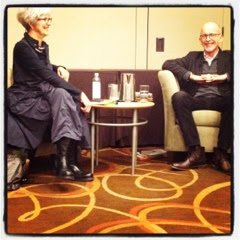MLA Boston
 |
| Interviewer Patricia Yaeger and Mark Doty |
For the last few days, I've been checking out the sessions and gatherings at the Modern Language Association's (MLA) annual convention in Boston. This was my first visit to the convention, which is a gathering of teachers and scholars in the field of language and literature study. The focus is on research and scholarship, as well as lots of candidates interviewing for teaching positions.
Admittedly, this convention, which I think had numbers upwards of 10K attendees, makes my hungry for AWP. But, it did open my eyes to what it means to maintain an academic career beyond the classroom. My love is not traditional research, but there is a place, certainly, for scholarly interests and professional development. And in some ways, MLA as an organization acts similarly to a union, acting as a collective body lobbying for fairness--at least that's my take.
****
I was surprised at how many presentations were read verbatim from the scholarly paper. The sessions I attended that most appealed to me were the ones in which the panelists veered from the paper and interacted with the audience.
My favorite session was a presentation on Black Poetics and questions of form and formalism and "the black aesthetic." That panel featured the beautiful and talented John Keene. Even though the organizers gave this panel what seemed like the smallest conference room in the hotel, it was very well attended.
I loved seeing so many beautiful faces in the room.
****
Best line from the Black Poetics panel: "We have had more black poets laureate than black presidents."
****
And then there was the Saturday afternoon event, A Conversation with Mark Doty. I could write a whole blog post on his presentation. This is a Mark Doty I had not seen before, breaking down his own work in conversation, commenting on his poetry and memoir. Not having read his nonfiction works, I felt I had learned something new about him and his motivations for writing. It was a surprisingly open conversation.
Maybe I am most interested in looking at Mark's work from his early poems to now to see how it has cycled between formal to plain-spoken, from long to short poems and back again. Hats of to Patricia Yaeger for conducting a brilliant interview.
Comments